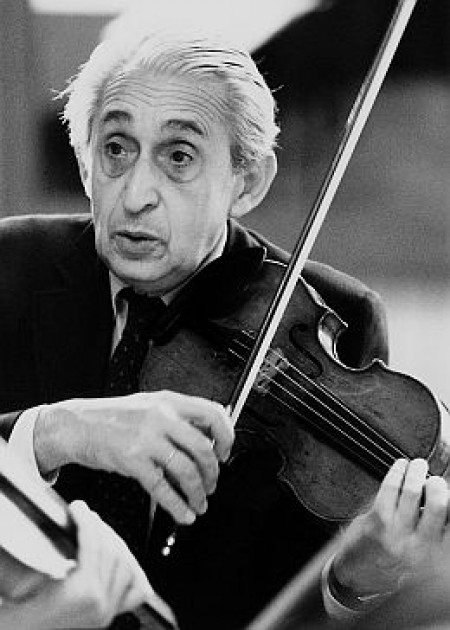20 February 1918, Budapest – 23 March 2004, Toronto
Loránd Fenyves attended one of the last of Jenő Hubay's legendary violin classes in 1934. He was aged only sixteen when, following lengthy studies with Oszkár Studer at the Music Academy, he completed the artists' training in only a year. As with all the Hungarian musicians of his generation, the chamber music teaching of Leo Weiner played a decisive role in his artistic development. It was complemented by quartet playing studies with Imre Waldbauer. Like many other interested instrumental players, he also visited for a while Zoltán Kodály's composition classes. He gave a characteristically lively account of the stimulating atmosphere of the Music Academy in the thirties: "In those days things were different everywhere in the world, thus here, too. For example: I had nothing to do with Bartók. Yes, but Bartók taught at the Music Academy! He walked up the same stairs that I did! When Bartók walked along the corridor at three, I was there already at half past two. And when they asked me at home what had happened that day, I could say: I greeted Bartók! Of course he did not reply, did not even notice me, but I had greeted him, standing a mere metre away from him, and that was enough to give me pleasure all week!"
In 1936 Bronislaw Hubermann, in Budapest on a visit, invited Fenyves to join the Palestine Symphony Orchestra (the Israeli Philharmonic since 1948), which was being formed then. Though he had another tempting offer from a Swedish orchestra as well, he nonetheless decided to join the pioneer undertaking. Thus, he had to play his part in the creation of musical culture in a country gradually being populated and living almost continuously under conditions of war. He was orchestral leader under the baton of Toscanini, later Bernstein and a host of other world-famous conductors, but frequently appeared also as a soloist. With colleagues from Budapest, among them his sister, he founded and for two decades led the Israel String Quartet, in which, besides Alice Fenyves, the viola player and composer Ödön Pártos and the cellist László Vincze participated. With several other musicians originally from Hungary, he was also a founding professor of the Tel Aviv Music Academy.
In 1957, Fenyves left Israel and for a while moved to Geneva, where he became the leader of the Suisse Romande under Ernest Ansermet, and a professor of the Geneva Conservatoire. We can admire his ability as leader – or, as with Rimsky Korsakov's Scheherezade, his talent as a soloist - on many famous discs. In 1966 he moved on to Canada. Here he gave up orchestral playing and concentrated on giving concert performances and teaching at Toronto University. He became a one-man public institution in the musical life of Canada, teaching at several universities and at the summer courses of the Banff Music Centre. The latter was the home of Zoltán Székely, and a very popular place to visit among Hungarian musicians. Even beyond the age of eighty, Fenyves travelled a great deal. He led regular master courses in Tokyo and Madrid, and occasional ones elsewhere.
It was after an absence of fifty years, in 1986, that he visited Hungary again. Thereafter for the next decade he was a regular guest of Hungarian musical life. That is how Kristóf Csengery once characterised his playing: "He represents another age, another mentality, an approach to music that is different from the current one: one which was able, while taking the compositions completely seriously, nonetheless to create some sort of close, informal relationship between the piece and the performer. And this relationship, as we can observe in every little phrase of Fenyves' playing, each bowing movement, has a magic." Commissioned by the Academy, over several years, for a week at a time, Hungarian violinists were able to listen to his advice based on his inexhaustible fund of experience. János Kárpáti wrote about him on his eightieth birthday: "He has no methodology of his own, yet Loránd Fenyves is one of the greatest musician-teachers of the second half of the 20th century. The secret of his teaching lies in his knowledge of the work that goes to its essence, and in the mutual respect, and even affection between teacher and pupil."
His remarkable memory was an inexhaustible store of information on 20th century musical history. He knew practically every prominent musician, and had some thoughts grasping their essence, or an anecdote with a lesson. It was the overriding respect he felt for music-making and his wise understanding of people that made him someone who not only as a musician but also as a fatherly friend made a mark lasting a lifetime on his acquaintances and pupils.
P. H.



